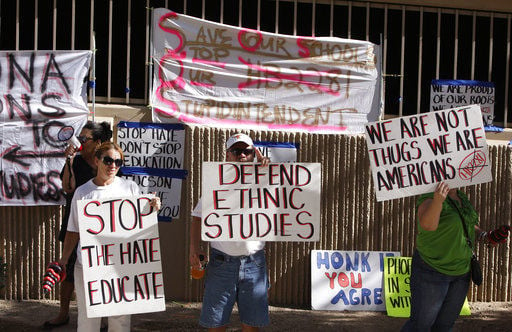A two-week trial questioning whether a law banning Tucson Unified’s Mexican American Studies program was crafted with racist intent came to a close Friday without a ruling.
The bench trial in the U.S. District Court in Tucson was the latest development over a 2010 state law that bans ethnic-studies programs that promote resentment toward another race or ethnic solidarity.
The trial sought to determine whether state officials, including former schools chiefs Tom Horne and John Huppenthal, who openly spoke against the program, had racist or discriminatory intent in enacting and enforcing the law.
Former Mexican American Studies teachers and students brought the lawsuit in 2010, saying the law violated their constitutional rights. Their claim was dismissed in 2013, but a federal appeals court remanded the case to district court.
In closing arguments and rebuttals, attorneys for both the plaintiffs and defendants called each other “desperate,” trying to discredit evidence they each presented .
Steve Reiss, an attorney for the plaintiffs, argued the law was created specifically to target TUSD’s MAS program, saying an education department staffer under Horne worked with legislators to craft the language.
He also said the law was not needed in the first place if the motive was to eliminate some problematic class material, because an existing law would have done that.
Reiss also pointed out that the department disregarded an independent audit it commissioned and paid for $110,000 for, while issuing its own findings based on a questionable investigation.
The plaintiffs pointed to comments Huppenthal made online, including referring to MAS as “KKK in a different color” and calling for the elimination of Spanish billboards, television or newspapers, as proving “raw, unadulterated” racist intent.
But the evidence plaintiffs’ attorneys presented were “a boatload of red herrings,” said Leslie Cooper, a state attorney. “They simply haven’t substantiated their claims.”
Cooper said private comments Huppenthal made did not influence public decisions, adding that there were legitimate pedagogical concerns from experienced educators who were department staffers over biased and controversial material. MAS was teaching students “what to think, not how to think,” she said.
She also pointed out that Curtis Acosta, a former Latino literature teacher who testified in the trial, showed disrespect and defiance for authority, as evidenced by a Che Guevara poster on his classroom wall and the fact that he wrote a rap song referring to public officials as “butt-kissing wangsta” and “Neanderthals.”
U.S. Circuit Judge A. Wallace Tashima, who oversaw the trial, is expected to issue a ruling in the next few weeks.





